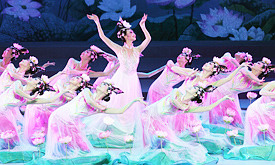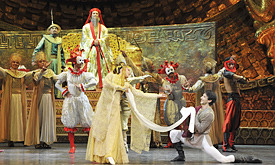|
 |
 |
|
LOCALIZED PERFORMANCE: China Oriental stages a show featuring China's traditional ink painting at Beijing Expo Theater on September 9 (CFP) |
SPLENDID SHOW: China Oriental stages the opera Marco Polo at the National Center for the Performing Arts on December 22, 2010 (HUANG JINGWEN) |
After assuming the post, he called more than 50 meetings to discuss solutions and spoke to more than 200 of the group's members about their concerns.
"Many were worried that the reform would affect their income," said Gu. "For decades, the ensemble was mainly supported by government subsidies. Their concerns weren't surprising. They felt safe in the iron-bowl system and were not inclined to change. But change can't be stopped."
To alleviate this anxiety, the group offered double pensions, medical and unemployment insurance, and a housing allowance to all its members.
And to assuage concerns that members would simply be discarded after they passed the peak of their performing lives, the group guaranteed that senior members would be able to find positions at company's new training center, or in areas such as management, marketing and human resources.
After six months of effort, in May 2010, all 484 performers had signed contracts with the group.
Production department director Song Bingfu said that before the reform, the shortage of regular shows meant less than 20 of the vocal team's singers were able to perform, and less than 20 of the 73 instrumentalists received regular spots.
"Many received a salary from the ensemble every month but had only been moonlighting," Song said.
"It was a waste of both money and talent," said Gu, who also worked to create more opportunities for young artists.
Before the reform, dancers joined the company after graduation, usually at around the age of 20.
They first did a year-long internship and then entered the troupe as Level 4 dancers, progressing to Level 3 after four years and level 2 in another four. If you wanted to be a principal dancer, you had to wait another few years. Young members desperately waited for veterans to retire. Upon finally becoming principal dancers in their late 30s, they found they had passed their prime. Many decided not to waste their peak performing years and left.
Gu's reforms made the system much more flexible. 28-year-old Teng Yu was a level 3 dancer in 2009 but she was chosen to be the principal dancer at the group's Expo performance in 2010.
"It was impossible before the reform," said Teng, who said she could not have been a principal dancer until the age of 33 according to the old system. "I never thought I could play the leading role at this young age."
New talents discovered during the national singing and dancing competition have also been absorbed to the group. "We need a lot of new blood while reviving veterans' passion," said Gu.
Just a year after the reform, China Oriental now stages twice the performances it used to do and all its qualified members regularly appear on stage. The income of the performers has increased sharply.
Performers' average salaries have increased from less than 4,000 yuan ($625) to 7,000 yuan ($1,094) a month, plus extra for every show in which they appear.
Group dancers can earn 111,000 yuan ($17,344), and principal dancers, such as Teng, expect 300,000 yuan ($46,875) a year.
"This is just the start of the reform and we still have a long way to go," said Gu.
"The group can perform many high-quality operas but most are in foreign languages and are far from ordinary people's lives," said Xu Peidong, Vice Chairman of Chinese Musicians Association, who suggested the group produce more performances with Chinese features.
"To be honest, I feel that stage arts have lost their originality in China," said Gu. "China has a long and splendid history. We are making efforts to deliver high-quality examples of traditional Chinese culture to our audiences through music and dance, and strengthen our cultural influence. That's a must for us."
On September 8-9, China Oriental staged a performance featuring Chinese ink painting at the Beijing Expo Theater. "We depict the images of flowers, mountains and brooks in our performance and create a picture of Chinese ink painting with singing and dancing," said Gu.
In 2010, the group's box office revenue exceeded 100 million yuan ($ 15.63 million), an extraordinary achievement for a performing arts group. But Gu insisted box office revenue should not be the group's main income.
"A company can't rely on box office revenue alone. We must create as much added value as possible to translate our golden name into golden returns," Gu said. "Our goal in the following two years is to conduct shareholding reform and get listed." | 